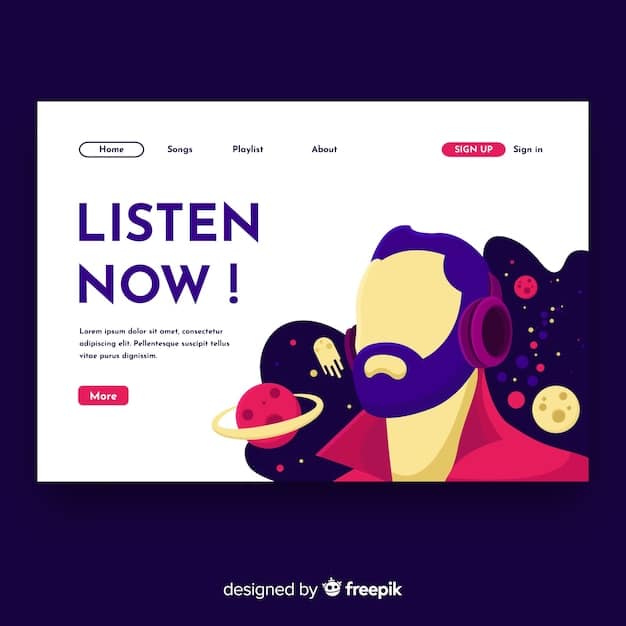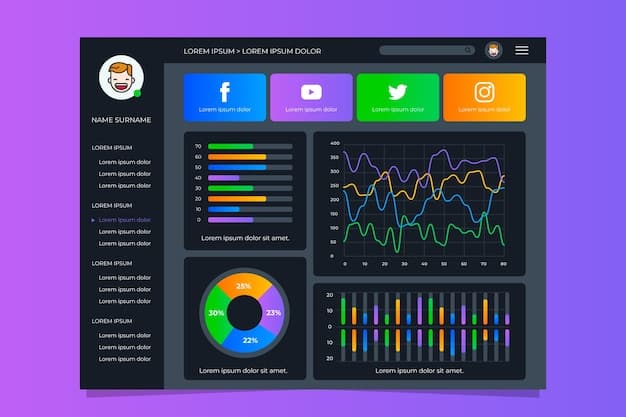Podcast Guest Outreach: Proven Strategy for High-Profile Interviews

Achieving successful podcast guest outreach involves a refined, strategic approach focused on mutual value and authentic connection to secure interviews with high-profile guests.
Embarking on the journey of securing high-profile guests for your podcast can seem daunting, yet it’s a pivotal step in elevating your show’s authority and appeal. Mastering effective podcast guest outreach isn’t merely about sending emails; it’s an art built on meticulous research, strategic communication, and a clear understanding of mutual benefit. This guide unveils a comprehensive, proven strategy designed to transform your outreach efforts into successful interview bookings, ensuring your podcast shines with remarkable voices.
The Foundation of Effective Outreach: Why Strategy Matters
Successful podcast guest outreach extends far beyond a simple cold email. It requires a foundational understanding of what makes a guest say “yes,” and how to position your podcast as an irresistible opportunity. Many podcasters fall into the trap of generic requests, overlooking the critical preparatory steps that set the stage for success. High-profile individuals, by nature, have limited time and a multitude of requests, making a haphazard approach nearly invisible.
Building an effective strategy begins with introspection about your own podcast. What unique value do you offer guests? How does your show differentiate itself in a crowded podcast landscape? Answering these questions provides the bedrock for crafting compelling pitches that resonate. This isn’t just about what they can do for your podcast; it’s about what your podcast can do for them. Thinking from their perspective is paramount, considering their brand, their audience, and their goals.
Understanding Your Target Guest’s Landscape
Before even thinking about drafting an email, deep dive into the potential guest’s world. This means more than just a quick glance at their LinkedIn profile. Explore their recent interviews, publications, social media activity, and even their past podcast appearances. What topics do they frequently discuss? What are their current projects or book releases? What messages are they trying to convey?
- Research Existing Content: Analyze their blogs, articles, books, and other media appearances to identify recurring themes and interests.
- Identify Their Goals: Consider what they might be promoting (a new book, a course, a cause) and how your podcast can align with those objectives.
- Observe Their Style: Understand their communication style, preferred platforms, and the tone of their public persona.
This comprehensive research allows you to tailor your pitch to their specific interests and current priorities, demonstrating that you’ve put in the effort to understand their work. It shifts your outreach from a generic request to a thoughtful, personalized invitation, significantly increasing your chances of capturing their attention. Without this groundwork, any outreach attempt is effectively shooting in the dark.
Moreover, understanding their typical interview style or preferred format can help you frame the conversation in a way that makes them comfortable and showcases their expertise effectively. This due diligence signals professionalism and respect for their time and contribution.
Crafting the Irresistible Pitch: Beyond the Generic Template
The pitch email is perhaps the most critical component of your outreach strategy. It’s your first impression, and often, your only chance to capture a high-profile guest’s attention. Ditch the generic templates; they instantly signal a lack of effort and genuine interest. Instead, focus on personalization, conciseness, and a clear value proposition. Your goal is to make it easy for them to say yes, or at least, to be intrigued enough to learn more.
Start with a compelling subject line that is specific, intriguing, and doesn’t sound like a sales pitch. Something like “Interview Invitation: [Guest’s Name] on [Specific Topic Relevant to Them] for Our [Podcast Name] Audience” is far more effective than “Podcast Interview Request.” The subject line should immediately convey relevance and personalization.
Personalization and Problem-Solving in Your Pitch
The body of your email must immediately establish why you’re reaching out to *them* specifically. Reference their work, a recent accomplishment, or a specific idea they’ve explored. Show, don’t just tell, that you’re familiar with their contributions. Then, articulate the unique value proposition your podcast offers. This isn’t about how great your podcast is; it’s about how being on your podcast benefits them.
- Acknowledge Their Work: Start by mentioning something specific and insightful about their recent work or a particular idea they advocate.
- Highlight Mutual Benefit: Clearly explain how their appearance will benefit their goals, brand, or current projects. Focus on their audience, not just yours.
- Propose a Specific Topic: Suggest a unique angle or topic that aligns with their expertise but also offers a fresh perspective for their audience.
Keep the pitch concise and to the point. Busy individuals skim emails. Get straight to the request, outline the benefit, and provide clear next steps. Avoid lengthy paragraphs or an overly enthusiastic tone that might come across as desperate. Professionalism and respect for their time are key.
Remember, the goal is not just to get them on your show, but to make their appearance a successful one for them. By framing your pitch around their needs and interests, you transform a transactional request into a collaborative opportunity, increasing the likelihood of a positive response. This approach transcends simple booking; it builds relationships.

Navigating the Outreach Process: Channels and Timing
Once your irresistible pitch is crafted, the next challenge is getting it in front of the right person at the right time. There’s no single universal channel for all high-profile guests, and often, a multi-pronged approach is most effective. The key is to be strategic and persistent without being pushy or annoying. Timing often plays a significant role in the success of your outreach, aligning with their current projects or public visibility.
Email is almost always the primary channel. However, finding the right email address can be a quest in itself. Start with their official website, press kits, or media contact pages. Sometimes, a direct email to them or their agent/publicist is listed. If not, services that help find professional email addresses can be useful, but always use them ethically and with respect for privacy. Social media, particularly LinkedIn or Twitter, can serve as a supplementary channel for initial contact or follow-ups, especially if direct email information is elusive.
Optimal Channels and Follow-Up Strategies
Strategic channel selection involves understanding where your target guest is most active and receptive to professional inquiries. For public figures, their agents or publicists are often the preferred point of contact for media requests. Crafting your pitch specifically for these gatekeepers can be crucial, as they filter inquiries for their clients.
- Direct Email: The primary method, aiming for their personal or professional email, or their representative’s.
- LinkedIn Outreach: A professional platform for connecting, often effective for thought leaders and business professionals.
- Agent/Publicist Contact: For high-profile individuals, their representation is usually the first point of contact. Tailor your pitch to demonstrate professionalism and clear value.
The follow-up is as important as the initial outreach. Many successful bookings happen after the second or third touchpoint. However, there’s a fine line between persistence and pestering. Generally, one polite follow-up a week after the initial email is acceptable. If no response, a final follow-up acknowledging their busy schedule and reiterating your interest a week or two later can be effective. After that, it’s best to move on.
Regarding timing, consider their public schedule. Are they launching a new book? Speaking at a major conference? These are opportune moments when they are actively seeking platforms for promotion. Aligning your outreach with such events can significantly increase your chances of a positive response, as it offers immediate, tangible value to their current objectives.
Preparing for the Interview: Making a Stellar Impression
Securing the interview is only half the battle; the real work begins in preparing for it. A well-prepared interview not only showcases your professionalism but also ensures a valuable and engaging discussion for your audience and a positive experience for your guest. High-profile individuals expect a certain level of preparedness and efficiency, and meeting these expectations can solidify your reputation as a host worth working with.
Thorough research continues to be the backbone of your preparation. Go beyond what you’ve done for the outreach pitch. Dive deeper into their background, specific achievements, and any subtle nuances of their public persona. Listen to other interviews they’ve done, but always aim to ask original questions that haven’t been overdone. Your goal is to unearth new insights and perspectives that make your interview stand out.
Structured Preparation and Technical Readiness
Develop a clear (but flexible) outline for the interview. This includes key talking points, specific questions, and any areas you want to explore in depth. Share this outline, or a version of it, with your guest in advance. This allows them to prepare, reflect, and ensures that the conversation flows naturally and covers the most valuable ground. Give them the opportunity to add or remove topics as they see fit.
- Detailed Research: Go beyond surface-level information; explore nuanced aspects of their work and thoughts.
- Question Framework: Prepare thoughtful, open-ended questions that encourage detailed responses and genuine dialogue.
- Outline Sharing: Provide the guest with a clear outline or list of topics in advance to facilitate their preparation.
Technical preparation is equally crucial. Ensure your audio quality is professional, your internet connection is stable, and you have backup plans in case of technical glitches. Test your equipment well in advance of the interview. For remote interviews, consider using platforms that offer high-quality audio and video recording. A smooth technical experience minimizes stress for both you and your guest.
Finally, practice active listening during the interview. While you have your questions prepared, be ready to deviate if the conversation leads to an unexpected but fascinating tangent. High-profile guests appreciate a host who can truly engage and adapt, rather than rigidly sticking to a script. This flexibility often leads to the most compelling and memorable conversations.
Maximizing Impact Post-Interview: Promotion and Relationship Building
The interview doesn’t end when you hit the stop recording button. The post-interview phase is crucial for maximizing the impact of your guest’s appearance, extending its reach, and, most importantly, nurturing the relationship you’ve built. Effective promotion ensures that the valuable content you’ve created reaches the widest possible audience, benefiting both your podcast and your guest.
Begin by thanking your guest sincerely for their time and insights. Follow up with a written thank-you note or email shortly after the recording. This simple gesture of gratitude is often overlooked but leaves a lasting positive impression. Provide them with a clear timeline for when the episode will be released, how they can access it, and any promotional materials you’ll share.
Strategic Promotion and Sustaining Connections
Develop a robust promotion plan for the episode. This should include sharing details with your guest about how and where you’ll be promoting the episode and making it easy for them to share it with their audience. Provide them with direct links, embed codes, and pre-written social media snippets they can use. The easier you make it for them to promote, the more likely they are to do so.
- Shareable Assets: Create compelling audiograms, video snippets, and quote cards for easy social media sharing.
- Personalized Thanks: Send a prompt, personalized thank-you note or email after the interview.
- Follow-Up with Metrics: Consider sharing performance metrics (e.g., initial download numbers, key insights) after the episode has been live for a while.
Leverage your own social media channels, email list, and website to actively promote the episode. Tag your guest in posts, use relevant hashtags, and consider running targeted ads if appropriate. Encourage your audience to share the episode and engage with the content. Remember, the goal is not just to promote your podcast, but to amplify your guest’s message and reach new listeners.
Finally, consider how you can maintain a positive, long-term relationship with your guest. This could mean occasionally checking in, sharing relevant articles with them, or even inviting them back for a future episode on an updated topic. A good relationship can lead to future collaborations, referrals, and a stronger network within your niche. High-profile guests often move in influential circles, and a strong positive impression can open doors you hadn’t even considered. This extends beyond the single interview to a mutually beneficial professional connection.
Overcoming Common Outreach Challenges: Persistence and Adaptability
Even with the most meticulously crafted strategy, podcast guest outreach is not without its hurdles. Rejection, silence, and logistical complexities are part of the process, especially when targeting high-profile individuals. The key to long-term success lies in cultivating resilience, learning from every interaction (or lack thereof), and constantly adapting your approach. Don’t let a “no” or no response deter you; view it as an opportunity to refine your method.
One of the most common challenges is simply not hearing back. High-profile individuals and their teams are bombarded with requests. Your email might get buried, or it might not have resonated strongly enough. This isn’t necessarily a reflection of your worth or the quality of your podcast. It’s often a matter of timing, bandwidth, or simply a misalignment of priorities. Instead of becoming discouraged, analyze your pitch. Was it clear enough? Was the value proposition obvious? Did you contact the right person?
Strategies for Bouncing Back and Refining Your Approach
When faced with a lack of response, or even a polite “no,” don’t take it personally. Instead, pivot and refine. Revisit your initial research. Is there a different angle or a more compelling reason this guest would benefit from appearing on your show now? Perhaps their current priorities have shifted. Adaptability is key, and a willingness to tweak your pitch based on perceived gaps is invaluable.
- Review and Revise: If an initial approach fails, analyze your pitch for clarity, conciseness, and value proposition.
- Explore New Angles: Consider a different topic or a fresh perspective that might better align with the guest’s current endeavors.
- Diversify Outreach Channels: If email isn’t yielding results, cautiously explore LinkedIn or agent contact as alternatives.
Also, consider leveraging existing connections. A warm introduction from a mutual acquaintance or a past guest can dramatically increase your chances of success. Networking within your industry and building genuine relationships can provide invaluable access to individuals who might otherwise be out of reach. These referrals bypass many of the initial barriers of cold outreach and lend immediate credibility to your request.
Finally, remember that persistence is a virtue, but it must be balanced with respect. A polite follow-up is appropriate; barraging someone with emails or social media messages is not. Know when to shift your focus to other potential guests and when to revisit a target at a later, more opportune time. The landscape of podcast guests is vast, and a single “no” does not define your outreach capabilities. Each attempt, successful or not, contributes to a stronger, more refined strategy for the future.
Building Your Guest Roster: From First Guest to Influencer Network
The journey of securing high-profile guests is not a one-off event; it’s a continuous process of building and nurturing relationships that can evolve into a robust network of industry leaders and influencers. Starting with your first successful booking, each guest becomes a potential gateway to others, expanding your reach and solidifying your podcast’s reputation as a platform for insightful conversations. The initial wins lay the groundwork for exponential growth.
Think of your guest appearances not just as individual interviews, but as interconnected nodes in a growing network. A positive experience for one high-profile guest can often lead to referrals to their colleagues or peers. This “word-of-mouth” recommendation within influential circles is immensely powerful, often opening doors that direct cold outreach simply cannot. Encourage your guests to share their experience with their network, not just the episode itself.
Leveraging Current Guests for Future Opportunities
Actively seek feedback from your guests about their experience on your show. Understanding what they enjoyed, or what could be improved, helps you refine your process for future bookings. A guest who feels valued and respected is more likely to recommend your podcast to others. This positive feedback loop is crucial for organic growth and reputation building.
- Encourage Referrals: Subtly ask satisfied guests if they know anyone else who would be a great fit for your show.
- Showcase Guest Testimonials: If a guest offers praise, ask if you can use it as a testimonial in future outreach efforts.
- Maintain Communication: Periodically check in with past guests, sharing updates about your show or relevant industry news.
Furthermore, consider strategic partnerships or collaborations. This could involve cross-promotion with other podcasters who share a similar audience but a different niche, or even co-hosting special episodes. These collaborations can introduce your podcast to new audiences and provide opportunities to connect with diverse high-profile individuals through shared projects. Building an effective guest roster is a marathon, not a sprint, requiring consistent effort and a genuine commitment to providing immense value.
Ultimately, the goal is to create an ecosystem where high-profile guests are not just willing to appear on your show, but eager to. This is achieved through consistent quality, respectful communication, and a reputation for producing valuable, engaging content. Each successful interview contributes to this reputation, making subsequent outreach efforts significantly easier and more fruitful. Invest in these relationships, and your guest roster will become one of your podcast’s greatest assets.
Metrics and Measurement: Tracking Your Outreach Success
In the world of podcast guest outreach, intuition and anecdote alone won’t suffice. To truly refine your strategy and scale your efforts, it’s essential to implement a system for tracking your outreach metrics. This data-driven approach allows you to identify what’s working, what’s not, and where adjustments need to be made, transforming your efforts from guesswork into a precise, targeted campaign. Without measurement, progress is merely a hope, not a certainty.
Start by defining what success looks like for your outreach. Is it the number of interviews booked? The profile level of the guests? The audience growth directly attributable to a guest’s appearance? Having clear, measurable goals provides the baseline against which you can evaluate your performance. Then, ensure you have a simple, consistent way to log every outreach attempt, its outcome, and any relevant notes.
Key Metrics for Optimization
Several key metrics can provide invaluable insights into the effectiveness of your outreach strategy. Tracking these rigorously over time will show you patterns and opportunities for improvement. This quantitative approach allows for objective analysis, moving beyond subjective feelings about how your outreach is performing.
- Response Rate: The percentage of emails that receive a reply (positive or negative). A low response rate might indicate issues with your subject line or initial pitch.
- Conversion Rate: The percentage of responses that convert into booked interviews. This points to the effectiveness of your follow-up and value proposition.
- Average Outreach Time: The time from initial contact to a booked interview. Shorter times indicate greater efficiency in your process.
Beyond these primary metrics, consider tracking the source of your contact information (e.g., direct website, LinkedIn, referral), the type of guest (e.g., industry leader, author, entrepreneur), and the specific topics discussed. This granular data can reveal which channels are most effective for certain types of guests, or which topics generate the most interest. Tools like CRM software or even a simple spreadsheet can be invaluable for organizing this information.

Regularly review your metrics (e.g., monthly or quarterly) and make data-informed decisions. Is one type of subject line performing significantly better than others? Are referrals converting at a much higher rate than cold outreach? Use these insights to iterate on your strategy, experiment with new approaches, and continuously optimize your process. The most successful podcasters are often those who treat their outreach as an ongoing experiment, always seeking to learn and improve. This scientific approach to guest acquisition ensures sustained growth and high-quality content.
| Key Point | Brief Description |
|---|---|
| 🔍 Guest Research | Thoroughly investigate potential guests’ work, interests, and current projects to personalize outreach. |
| ✍️ Irresistible Pitch | Craft concise, personalized emails highlighting mutual value and specific relevance to the guest. |
| 🚀 Strategic Promotion | Maximize episode reach post-interview by providing shareable assets and maintaining guest relationships. |
| 📊 Track Metrics | Monitor response rates, conversion rates, and other data to continuously optimize outreach strategies. |
Frequently Asked Questions
▼
Start by checking their official website, media kits, or public speaking pages, which often list direct emails or agent contacts. LinkedIn can also be a valuable resource for professional connections. Services like Hunter.io or RocketReach might help, but always prioritize ethical and public-facing contact methods first.
▼
Personalization and clear value. Reference specific work or recent achievements, explain how their appearance directly benefits them (e.g., reaching new audiences, promoting a project), and suggest a unique, relevant topic. Keep it concise, professional, and easy to read, highlighting mutual benefit.
▼
Generally, one or two polite follow-ups are sufficient. Send the first about a week after the initial email, and a second, final one a week or two later if there’s no response. Overly persistent follow-ups can be counterproductive and may cause a negative impression, so know when to move on.
▼
E-E-A-T stands for Experience, Expertise, Authoritativeness, and Trustworthiness. In guest outreach, it means demonstrating your podcast’s credibility and quality. Highlighting strong past guests, quality production, and your own expertise shows potential guests that your platform is a trustworthy and authoritative place for their voice.
▼
Typically, high-profile podcast guests are not paid for appearances. Their compensation comes in the form of exposure, brand building, and promoting their work to your audience. Focus on the value proposition you offer, such as audience reach and content amplification, rather than monetary compensation.
Conclusion
Mastering podcast guest outreach is a nuanced, multi-faceted endeavor that extends beyond mere email sending. It requires a strategic mindset, meticulous preparation, and a genuine commitment to building valuable relationships. By prioritizing thorough research, crafting highly personalized and benefit-driven pitches, and meticulously planning for every stage from initial contact to post-interview promotion, podcasters can significantly increase their chances of securing interviews with high-profile individuals. Remember that persistence, adaptability, and a data-driven approach underpin long-term success. Every interaction is an opportunity to refine your process and expand your network, ultimately enhancing your podcast’s authority and reach. Embrace the journey with a focus on mutual value, and your guest roster will become a testament to your strategic prowess.





